Fiat Panda vs Vauxhall Astra – Which car suits you better?
Two cars, one duel: Fiat Panda meets Vauxhall Astra.
Which one wins in performance, efficiency and value for money? Find out now!
Costs and Efficiency: Looking at overall running costs, both models reveal some interesting differences in everyday economy.
Fiat Panda has a convincingly advantage in terms of price – it starts at 14100 £, while the Vauxhall Astra costs 25200 £. That’s a price difference of around 11057 £.
Fuel consumption also shows a difference: Vauxhall Astra manages with 2.20 L and is therefore significantly more efficient than the Fiat Panda with 5 L. The difference is about 2.80 L per 100 km.
Engine and Performance: Under the bonnet, it becomes clear which model is tuned for sportiness and which one takes the lead when you hit the accelerator.
When it comes to engine power, the Vauxhall Astra has a convincingly edge – offering 225 HP compared to 70 HP. That’s roughly 155 HP more horsepower.
In acceleration from 0 to 100 km/h, the Vauxhall Astra is significantly quicker – completing the sprint in 7.50 s, while the Fiat Panda takes 13.90 s. That’s about 6.40 s faster.
In terms of top speed, the Vauxhall Astra performs noticeable better – reaching 235 km/h, while the Fiat Panda tops out at 164 km/h. The difference is around 71 km/h.
There’s also a difference in torque: Vauxhall Astra pulls significantly stronger with 360 Nm compared to 92 Nm. That’s about 268 Nm difference.
Space and Everyday Use: Cabin size, boot volume and payload all play a role in everyday practicality. Here, comfort and flexibility make the difference.
Seats: Vauxhall Astra offers to a small extent more seating capacity – 5 vs 4.
In curb weight, Fiat Panda is distinct lighter – 1055 kg compared to 1341 kg. The difference is around 286 kg.
In terms of boot space, the Vauxhall Astra offers significantly more room – 422 L compared to 225 L. That’s a difference of about 197 L.
In maximum load capacity, the Vauxhall Astra performs noticeable better – up to 1339 L, which is about 469 L more than the Fiat Panda.
When it comes to payload, Vauxhall Astra clearly perceptible takes the win – 509 kg compared to 365 kg. That’s a difference of about 144 kg.
Who comes out on top?
Overall, the Vauxhall Astra shows itself to be leaves the rival little chance and secures the title of DriveDuel Champion.
It convinces with the more balanced overall package and proves to be the more versatile choice for everyday use.
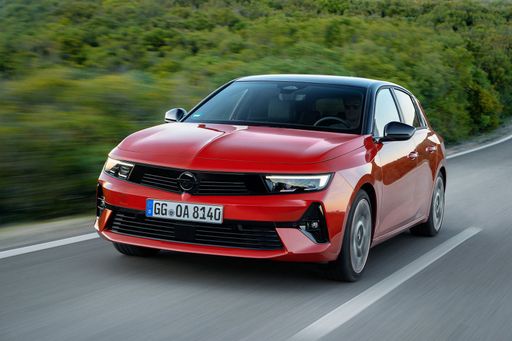
Vauxhall Astra
Fiat Panda
The Fiat Panda is a compact city car that brilliantly combines practical design and efficient functionality. Its boxy shape provides ample interior space and visibility, making it a favourite among urban drivers. With its reputation for reliability and affordability, the Panda continues to be a top choice for those seeking a no-frills, dependable vehicle.
details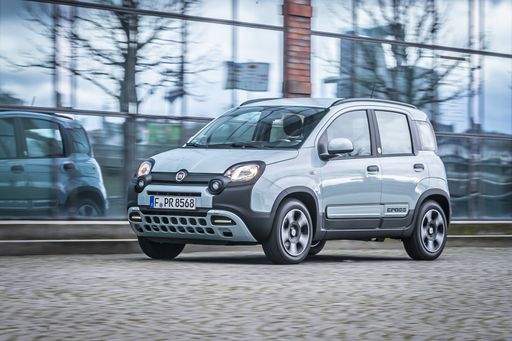 @ media.stellantis.com
@ media.stellantis.com
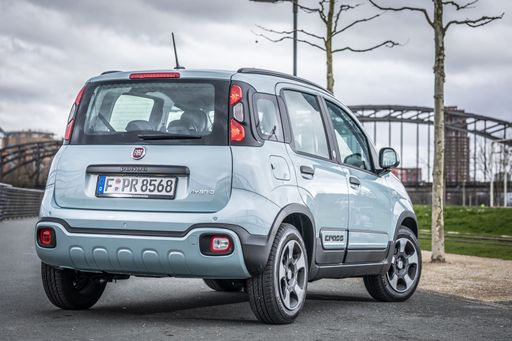 @ media.stellantis.com
@ media.stellantis.com
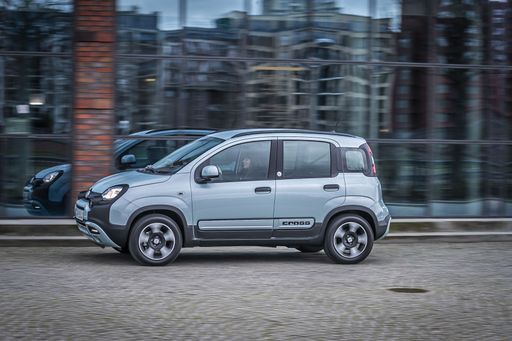 @ media.stellantis.com
@ media.stellantis.com
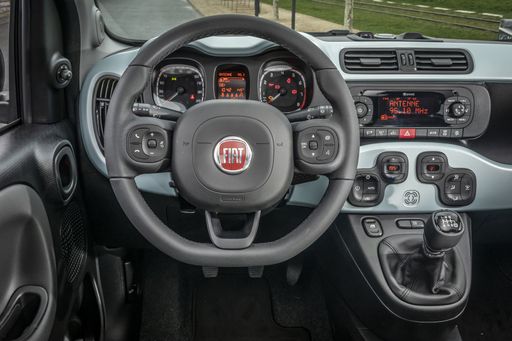 @ media.stellantis.com
@ media.stellantis.com
Vauxhall Astra
The Opel Astra exudes a sleek and modern design, making it a standout choice in the compact car segment. Its interior is thoughtfully crafted, providing both comfort and cutting-edge technology for an enhanced driving experience. The vehicle is also celebrated for its efficient performance, adeptly balancing power with fuel economy to suit urban and long-distance journeys alike.
details @ www.media.stellantis.com
@ www.media.stellantis.com
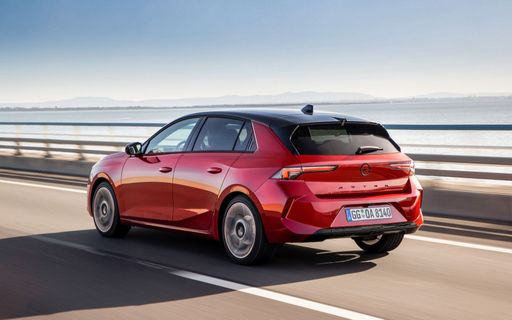 @ www.media.stellantis.com
@ www.media.stellantis.com
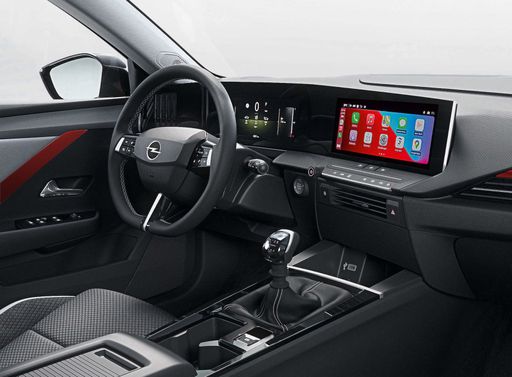 @ www.media.stellantis.com
@ www.media.stellantis.com

|

|
|
|
|
Costs and Consumption |
|
|---|---|
|
Price
14100 £
|
Price
25200 - 40500 £
|
|
Consumption L/100km
5 L
|
Consumption L/100km
2.2 - 6 L
|
|
Consumption kWh/100km
-
|
Consumption kWh/100km
15.40 kWh
|
|
Electric Range
-
|
Electric Range
82 - 419 km
|
|
Battery Capacity
-
|
Battery Capacity
51 kWh
|
|
co2
113 g/km
|
co2
0 - 135 g/km
|
|
Fuel tank capacity
38 L
|
Fuel tank capacity
42 - 52 L
|
Dimensions and Body |
|
|---|---|
|
Body Type
Hatchback
|
Body Type
Hatchback
|
|
Seats
4
|
Seats
5
|
|
Doors
5
|
Doors
5
|
|
Curb weight
1055 kg
|
Curb weight
1341 - 1736 kg
|
|
Trunk capacity
225 L
|
Trunk capacity
352 - 422 L
|
|
Length
3635 mm
|
Length
4374 mm
|
|
Width
1643 mm
|
Width
1860 mm
|
|
Height
1551 mm
|
Height
1432 - 1488 mm
|
|
Max trunk capacity
870 L
|
Max trunk capacity
1268 - 1339 L
|
|
Payload
365 kg
|
Payload
414 - 509 kg
|
Engine and Performance |
|
|---|---|
|
Engine Type
Petrol MHEV
|
Engine Type
Petrol, Diesel, Electric, Petrol MHEV, Plugin Hybrid
|
|
Transmission
Manuel
|
Transmission
Manuel, Automatic
|
|
Transmission Detail
Manual Gearbox
|
Transmission Detail
Manual Gearbox, Automatic Gearbox, Reduction Gearbox, Dual-Clutch Automatic
|
|
Drive Type
Front-Wheel Drive
|
Drive Type
Front-Wheel Drive
|
|
Power HP
70 HP
|
Power HP
130 - 225 HP
|
|
Acceleration 0-100km/h
13.90 s
|
Acceleration 0-100km/h
7.5 - 10.6 s
|
|
Max Speed
164 km/h
|
Max Speed
170 - 235 km/h
|
|
Torque
92 Nm
|
Torque
230 - 360 Nm
|
|
Number of Cylinders
3
|
Number of Cylinders
3 - 4
|
|
Power kW
51 kW
|
Power kW
96 - 165 kW
|
|
Engine capacity
999 cm3
|
Engine capacity
1199 - 1598 cm3
|
General |
|
|---|---|
|
Model Year
2024
|
Model Year
2023 - 2025
|
|
CO2 Efficiency Class
C
|
CO2 Efficiency Class
D, A, C, B
|
|
Brand
Fiat
|
Brand
Vauxhall
|
Is the Fiat Panda offered with different drivetrains?
Available configurations include Front-Wheel Drive.
The prices and data displayed are estimates based on German list prices and may vary by country. This information is not legally binding.
